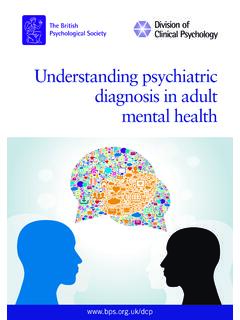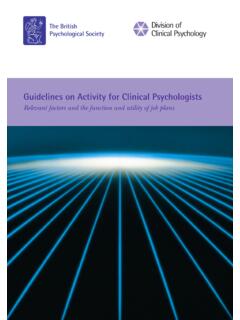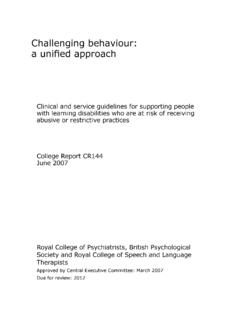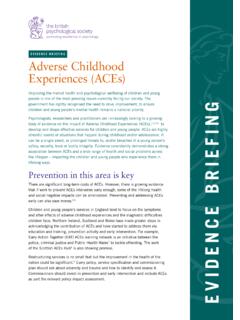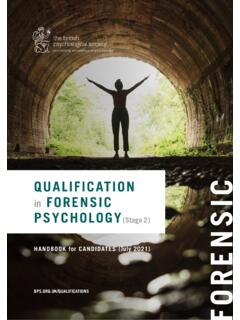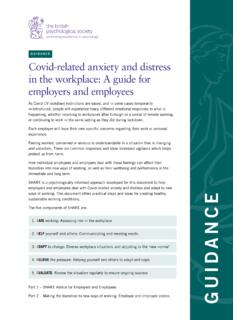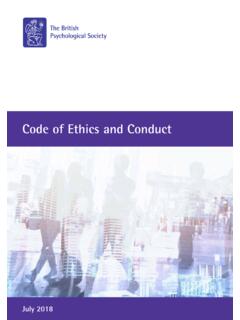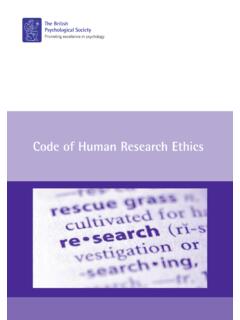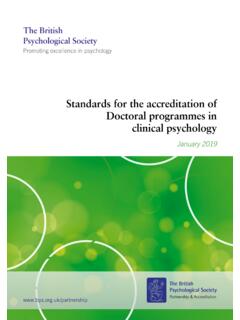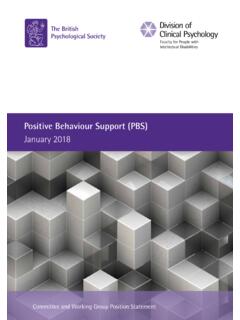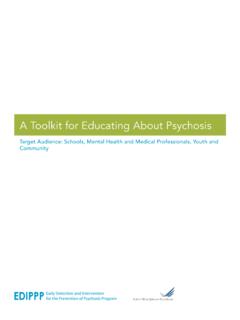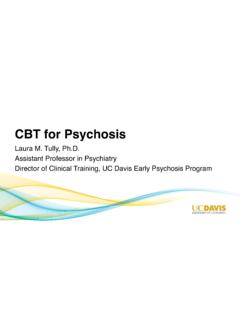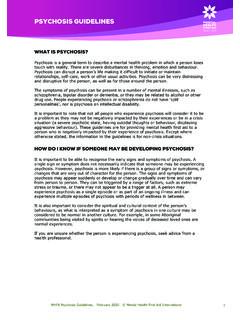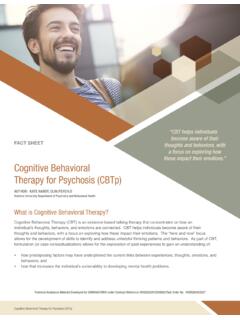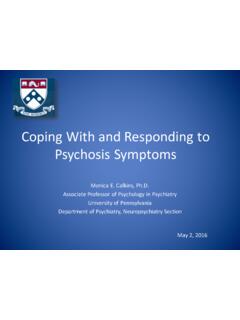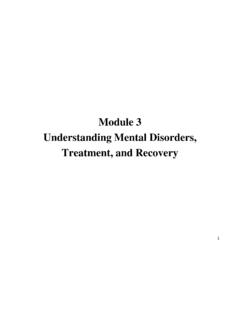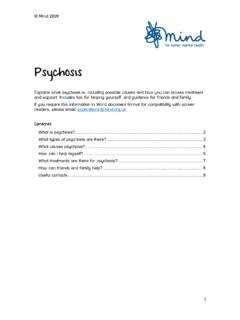Transcription of Understanding Psychosis and Schizophrenia
1 Understanding Psychosis andSchizophrenia Revised versionEdited by Anne CookeA report by the Division of Clinical PsychologyWhy people sometimes hear voices, believe things that others findstrange, or appear out of touch with reality, and what can help 9 781854 337481 ISBN 978-1-85433-748-1 Incorporated by Royal Charter Registered Charity No 229642 REP03 version 2017, originally published 2014 Printed and published by the British Psychological Society The British Psychological Society 2017 The British Psychological SocietySt Andrews House, 48 Princess Road East, Leicester LE1 7DR, UKTelephone: 0116 254 9568 Facsimile: 0116 247 0787 Email: Website: Psychosis and Schizophrenia (Revised version)This work is licensed under a Creative Commons CC BY-ND International :Anne CookeArt by:Anita Klein( )Many thanks to Anita for kindly allowing us to use her beautiful paintings free of :*AcknowledgementsWe are very grateful to Canterbury Christ Church University for supporting Anne Cooke to undertake this project; Dr Catherine Dooley, Dr Stephen Weatherhead and the Professional Standards Unit of the Division for commissioning and supporting this report; Dr Stuart Whomsley and the Psychosis and Complex Mental Health Faculty of the Division for helpful commentsand support.
2 Sophie Chatfield and Sarah Phillips for their skilled and enthusiastic help with research and referencing; Bruce Bassam for help and support over the course of this project; Helen and Nigel Cooke for helpful comments on making our language clear and accessible; Professor Peter Kinderman for his extensive help and support with the editing process; Dr Jayasree Kalathil and colleagues. Following the launch of this report, the editor Anne Cooke received an open lettersigned by Dr Kalathil, Professor Suman Fernando, Professor Philip Thomas and Dr Jan Wallcraft. It pointed out that thereport had engaged insufficiently with scholarship regarding the experiences of people from black and minority ethniccommunities in relation to Psychosis and Schizophrenia ,1that people from these communities were not represented onthe author group, and that changes were needed to the language in some sections.
3 Anne apologised for this and anumber of meetings took place to address these issues. This revised version published in 2017 includes amendmentsaddressing these issues and also the relationship between Psychosis and social inequality more generally, drafted inconsultation with the signatories and with Professor Nimisha Patel. Other critiques of the report will be addressed infuture editions. This revised version of the original edition is dedicated to contributor Steve Onyett who sadly passedaway in 2015. His contribution to improving mental health care was immense. We miss you Steve; Dr David Harper and Professor David Pilgrim for their extensive contributions to the preparation of this revised to the first report*This report draws on and updates an earlier one, Recent Advances in Understanding Mental Illness and PsychoticExperiences,which was published in 2000.
4 Thurstine BassetProfessor Richard BentallProfessor Mary BoyleAnne Cooke (co-ordinating editor)Caroline CupittJacqui DillonProfessor Daniel FreemanProfessor Philippa GaretyDr David HarperDr Lucy JohnstoneProfessor Peter KindermanProfessor Elizabeth KuipersProfessor Tony LavenderLaura LeaDr Eleanor LongdenDr Rufus MayProfessor Tony MorrisonDr Sara MeddingsProfessor Steve OnyettDr Emmanuelle PetersProfessor David PilgrimProfessor John ReadProfessor Mike SladeYan WeaverProfessor Dame Til WykesProfessor Richard BentallProfessor Mary BoyleProfessor Paul ChadwickAnne Cooke (co-ordinating editor)Professor Philippa GaretyDr Simon GelsthorpeDr Anne GoodwinDr David HarperDr Lucy JohnstoneProfessor Peter Kinderman (co-ordinating editor)Professor Tony LavenderDr Rufus MayProfessor Elizabeth KuipersDr Steve OnyettDr Emmanuelle PetersProfessor David PilgrimProfessor Mike SladeProfessor Dame Til Wykes* Listed in alphabetical order.
5 Contributor details are given at the end of the individual having unusual difficulties in coping with hisenvironment struggles and kicks up the dust, as it were. I have usedthe figure of a fish caught on a hook: his gyrations must lookpeculiar to other fish that don t understand the circumstances; buthis splashes are not his affliction, they are his effort to get rid of hisaffliction and as every fisherman knows these efforts may succeed. Karl MenningerThis publication has been produced by the British Psychological Society Division of Clinical Psychology and represents the views and expert contributions of the members of that Division all enquiries, including obtaining a printed copy of this document, please email (putting Understanding Psychosis in the subject line) or telephone 0116 252 : 978-1-85433-748-1 Revised version 2017, originally published 2014.
6 British Psychological Society 2017 This work is licensed under a Creative Commons Attribution-NoDerivatives InternationalLicence. Users may freely share this publication, in whole or in part, in digital or printedformats, for commercial and non-commercial purposes as long as the British PsychologicalSociety is credited, and according to the same licence terms. Users are not permitted todistribute any adaptations of the work, including translations. Understanding Psychosis1 ContentsPageForeword5 Executive Summary6 Note on Terminology7 Part 1: What is Psychosis ?Section 1: What this report is about: experiences sometimes called What does it mean to experience Psychosis ? Everyone s experiences are Our different cultures14 Section 2: How common are these experiences?
7 How many people have psychotic experiences? 15 How many are given a diagnosis of Schizophrenia ? People who do not use mental health services15 Section 3: Are these experiences best understood as mental illness? Can psychotic experiences be separated from normal ones? Many normal people have unusual experiences Are mental health diagnoses reliable can clinicians agree? Are mental health diagnoses meaningful? Do they refer to real things ? Naming something doesn t make it What a diagnostic label does not tell you Experiences are on a continuum and don t fall into neat 23categories The ever-expanding reach of mental health Has the idea of Schizophrenia arisen as a result of the 24 clinician s illusion ?
8 The advantages and disadvantages of seeing things as mental illness Recent recommendations to move away from using diagnoses 28 Section 4: How do these experiences affect people s lives? Variability in Which outcomes matter? Influences on The myth that Psychosis leads to violence 32 Part 2: Causes: why do so many people have these experiences and when do they become distressing?Section 5: Biology our brains Neurochemical Brain structure and Conclusions41 Section 6: Life experiences and how they affect Life events and Inequality, poverty, racism and discrimination 44 Section 7: The way we make sense of the world: the psychology of Psychosis The psychological link between life events and Hearing voices, inner speech and memories How we develop beliefs and reach conclusions The relationship between emotions and How psychotic experiences can lead to distress and disability How we make sense of our Positive aspects of Psychosis Spirituality55 Part 3: What can helpSection 8.
9 Arriving at a shared Understanding of the problem Deciding what is likely to help62 Section 9: Self-help, and help from family, friends and communities Support from friends and family How services can help friends and family to support Family meetings (sometimes called Family 66 Interventions ) Self-help and mutual The Hearing Voices Network Complementary Peer Community development approaches Recovery colleges: An educational approach to offering help The service user/survivor movement 712 Division of Clinical PsychologySection 10: Practical and emotional help from professionals Making sure basic needs are Emotional support Work and employment Help with organisation and Getting help Help at times of Keeping safe Self neglect, self harm and Risk to other Risk of harm from services Compulsion: using mental health legislation80 Section 11.
10 Talking psychological help Cognitive behaviour therapy (CBT) Effectiveness of cognitive behaviour Less formal support drawing on CBT related Cognitive Trauma focused therapy and psychodynamic Acceptance and commitment therapy and Mindfulness Narrative therapy Voice Helping Increasing Access to Psychological Finding an approach that suits Conclusions93 Section 12: How can medication help? Problems with antipsychotic Unwanted effects Collaborative decisions about Weighing up benefits and risks Finding the type of medication that suits you best Working out when to take medication Finding the right dose99 Understanding Psychosis3 Part 4: What we need to do differentlySection 13.
